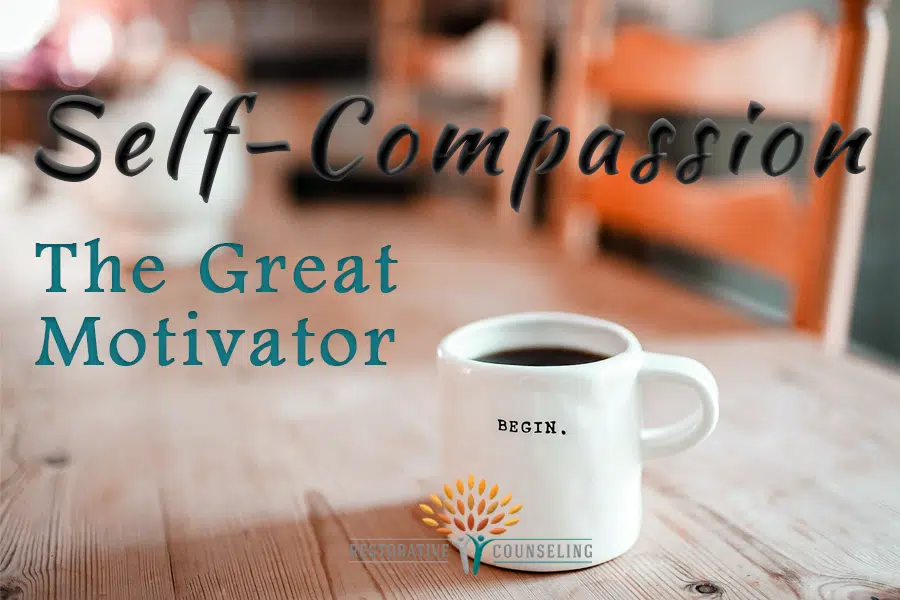Written by Katie Jackson-Griffin, LCPC
Escaping the cycle of negative self-talk to be your best self can be challenging. Here’s how you can combat that struggle with self-compassion and mindfulness.
Change is hard. While this is a common, cliché phrase, it is true! Trying to accomplish a goal can be frustrating, confusing, and overwhelming. It’s easy to get down on yourself about a lack of perceived progress. This can lead to a difficult cycle of negative self-talk, shame, and even more slow progress. So how does this cycle stop? Let’s examine Aniah’s story.
The Effects of Negative Self-Talk
Aniah has always had a dream of starting her own business. She wants to be able to use her artistic skills, but also have the flexibility to work as she pleases. Aniah knows that there are many steps she has to follow to make this a reality. As she works to save money to launch her business, Aniah is working a full-time job and a “side hustle” doing rideshare. Aniah works long hours, often 12 hours a day. When she gets home, she finds herself feeling discouraged. She only focuses on the dishes in the sink, the pile of dirty laundry, her half-done website, and a desperate need for a shower. So many thoughts run through her head:
“Why can’t I just be more organized?”
“Other people can hustle this hard, why can’t I?”
“I am being so lazy not getting these chores done.”
This negative thinking only pulls her down further. Aniah finds herself feeling sad and stuck about what to do next.
After some research online, Aniah finds the courage to seek out help through therapy.
Positive Self-Talk and Neutral Thinking
During her sessions, Aniah learns how much of an impact her negative self-talk was having on her emotions and motivation. She sees how she is getting in her own way and ignoring the positive steps she is making toward her goals. Aniah’s therapist reminds her that she can’t get everything done at once. Prioritizing means that some things need to be sacrificed. Aniah is putting too much pressure and judgment on herself.
Thus, Aniah discovers the power of self-compassion and neutral thinking.
Aniah now has the tools to help tolerate her emotions and focus on more than just the frustrating parts of achieving her goals. Her thoughts are now:
“I am frustrated that I don’t have energy to do my chores right now. I will listen to my body and rest to see if I can recover some energy.”
“I wish that I could accomplish this goal faster. It’s OK to be tired of hustling and still know that it’s my best option.”
“I am doing the best I can with taking on so much. I am still making progress.”
Aniah has noticed that she is able to do a bit more when she gives herself kindness. She no longer expects perfection. And she has been able to make some changes to her routines. She doesn’t expect herself to do her chores every day. She is kind to herself when she needs to buy easier, packaged food to get through a hard week. These difficult, but small changes have made all the difference in giving Aniah the energy to keep moving toward opening her own business.
Get support in fostering self-compassion
Let Us Help
How to Practice Self-Compassion
Do Aniah’s struggles sound familiar? It’s so common to be judgmental of your behavior. There is so much messaging about how we “should” act, and what makes you a “responsible” and “good” adult. However, all of these are based on individual values. Aniah had to identify her priorities. At this moment, it is working an extra job to save money. The rest of her values/goals just had to wait.
Here are three quick steps to break down this judgment and give yourself compassion
1. Identify your priorities
By understanding why you are making the choices you are, it helps silence the “should” thoughts. You get to decide why you choose to focus your energy in a particular direction. This is a very individual choice. Having your “why” will give you confidence!
2. Observe the emotion/experience
Instead of labeling yourself as “lazy”, “dumb”, or other put-downs, simply identify the emotion or experience. “Lazy” becomes “I don’t have the energy right now”, and “dumb” becomes “I don’t have this knowledge right now”. Of course, it is OK to be feel frustrated or irritated by this state, but it isn’t useful to judge it.
3. Set yourself up for success!
When you have clear priorities, you’ll see that expecting yourself to do everything just isn’t realistic. It is compassionate to make things easier on yourself. Buy the salad in a bag. Hire someone to clean your home. Let the laundry sit for a few more days. Give yourself compassion about what you are capable of when you are focused on your other priorities. This will significantly lessen the judgments toward yourself! By practicing self-compassion, you can unlock the power to embrace change.
And if you still need support, Restorative Counseling can help!
The entire team at Restorative Counseling believes in the power of self-compassion. Kindness to yourself can be the ultimate motivator to keep striving to accomplish your goals. Restorative Counseling is here to help support you. In order to get started, schedule an appointment with one of our clinicians today.

Hi, I’m Katie!
I use HAES and DBT approaches to help people overcome their challenges with low self-esteem, anxiety, and depression. Read more about me.
Follow Restorative Counseling
Sign up for our newsletter

